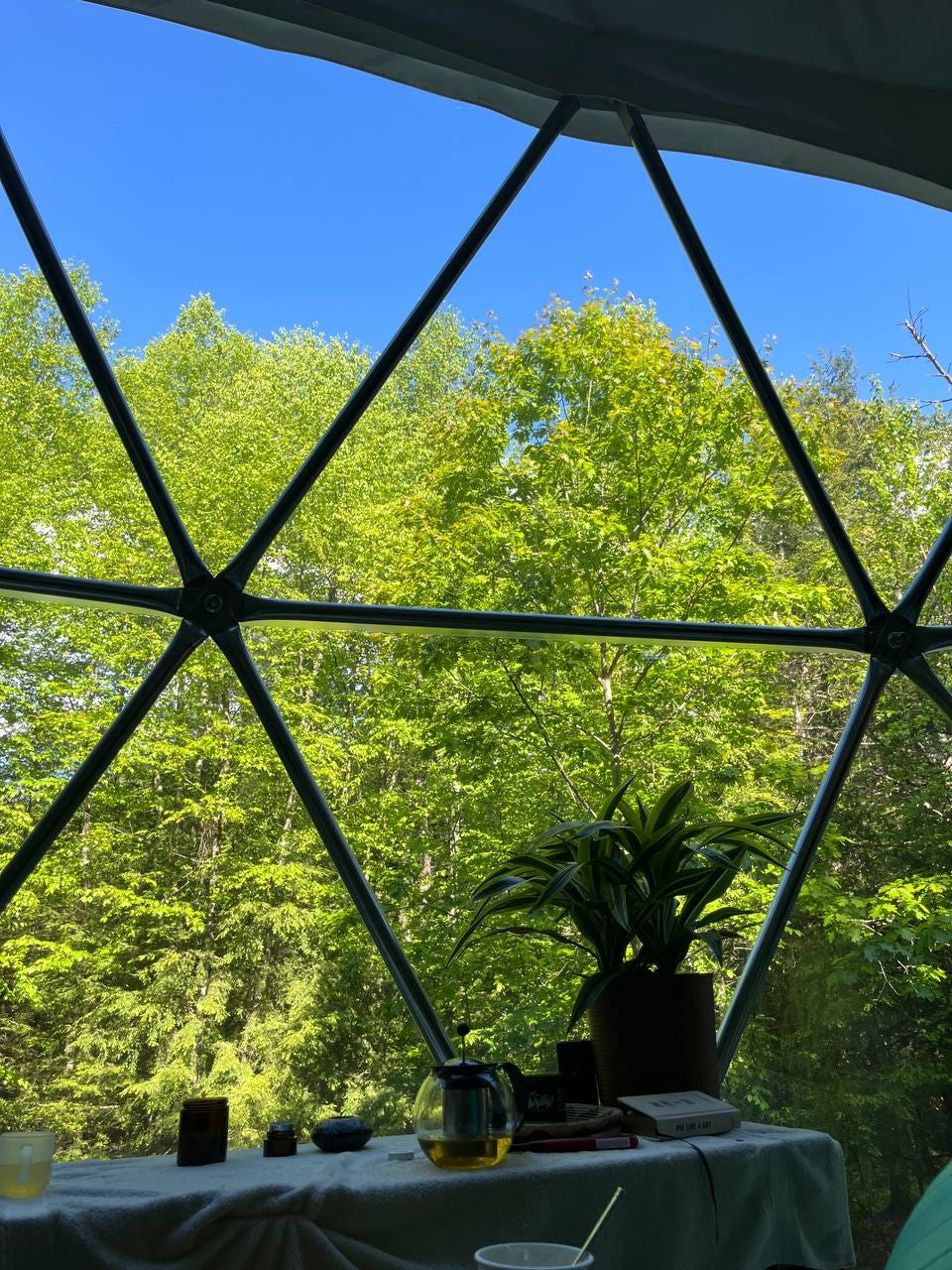'A Milieu of Belonging'
New Mutations discussion group happens on Sunday, June 8th.
Dear friends,
June is almost upon us, and I find myself at the threshold of settling in to the new space (construction has gone on a few months now, and with it, lots of chaos, and very little space to host regular calls).
We’ve been playfully calling it the ‘domestead.’
The land here is set up to host events (a large house, multiple cabins, campsites, etc.). I hope to offer something for the Mutations community here next spring (and for those who are local to New England or driving through, do reach out, as I am all for hosting dinners, salons, etc.).
From henceforth, I’ll be writing to you from here, which is to say, the critical zone called ‘Spaceship Earth.’
Paid subscribers will continue to (occasionally) hear from me about the trials, tribulations, follies and (one also hopes) insights that come with trying to live in a geodesic dome in rural Vermont. I expect that winter will really be something.
I now rent a small cabin on the land that functions as my first, true office. Books are on the shelves. Internet is back up and running. And I can finally start doing more regular calls.
I’ll be wrapping up the epilogue for the Fragments manuscript right here.
June Discussion Group
This semester I wrote two essays, “Life in the Ruins with Stengers and Whitehead,” and a much longer, far less precise, far more sprawling version for my final paper.
Let’s meet about that piece of writing, as well as the Stengers book it draws from.
What does it mean to practice philosophy in the ruins?
How do we begin to make a life, here, in relation with the Earth?
I’m of the mind that it is less helpful to continue to ask whether or not there is a meta-crisis/polycrisis, and whether or not this crisis requires a radical restructuration of our worldview. There is, and it does.
The questions that enliven me these days are the ones that ask: how can we begin to make a life, which is also to say, adapt, and as
writes about in his new book (imminent release), live from the future?Living from the future, to me, means learning to live well during a time of civilizational transition, and to begin embodying new modes of thinking and relating that are more appropriate to a process-oriented and ecological reality.
As Bill Thompson always talked about, we tell more than we know,. I would add that we are more than we know.
This is my contention. Paradigmatic transformations are already at hand, but, as Gebser describes, they are ‘latent.’ These mutations serve to work and rework our cultural imaginaries in the present.
The difficulty (and the task of both the artist and the philosopher) seems to lie in bringing forward these new ‘structures of feeling,’ which Stengers describes as a ‘milieu of belonging,’ in new cultural forms (from aesthetic to conceptual). The philosopher Gilles Deleuze talks about this (percepts and concepts). Media theorist Marshall McLuhan does too (artists anticipate cultural transformations). Gebser gives it primacy too, calling it ‘the new statement.’
‘Tentacular’ percepts, and concepts, are struggling to be born in our unthinkable present.
The role of spaces like this one have something to do with bringing the latent ‘mutations’ of culture to consciousness, and in that sense too, live from the future.
We’ll discuss all this in our session.
Sunday, June 8th at 9:30 am PT / 12:30 pm ET.
Subscribers will receive a reminder email with the Zoom link.
I know folks are probably hoping for new course offerings. Those are on the way. Something for the end of June, but it will be more like a workshop.
Keep reading with a 7-day free trial
Subscribe to Mutations to keep reading this post and get 7 days of free access to the full post archives.


